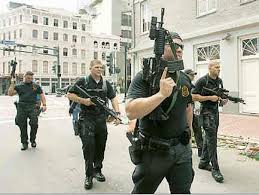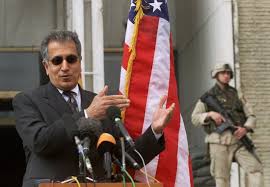 President Barack Obama has no plans to join a global treaty banning landmines because a policy review found the United States could not meet its security commitments without them, the State Department said on Tuesday.
President Barack Obama has no plans to join a global treaty banning landmines because a policy review found the United States could not meet its security commitments without them, the State Department said on Tuesday."This administration undertook a policy review and we decided that our landmine policy remains in effect," spokesman Ian Kelly told a briefing five days before a review conference in Cartegena, Colombia on the 10-year-old Mine Ban Treaty.

 War Glance
War Glance At a covert forward operating base run by the US Joint Special Operations Command (JSOC) in the Pakistani port city of Karachi, members of an elite division of Blackwater are at the center of a secret program in which they plan targeted assassinations of suspected Taliban and Al Qaeda operatives, "snatch and grabs" of high-value targets and other sensitive action inside and outside Pakistan, an investigation by The Nation has found.
At a covert forward operating base run by the US Joint Special Operations Command (JSOC) in the Pakistani port city of Karachi, members of an elite division of Blackwater are at the center of a secret program in which they plan targeted assassinations of suspected Taliban and Al Qaeda operatives, "snatch and grabs" of high-value targets and other sensitive action inside and outside Pakistan, an investigation by The Nation has found. Welcome to the wartime contracting bazaar in Afghanistan. It is a virtual carnival of improbable characters and shady connections, with former CIA officials and ex-military officers joining hands with former Taliban and mujahedeen to collect US government funds in the name of the war effort.
Welcome to the wartime contracting bazaar in Afghanistan. It is a virtual carnival of improbable characters and shady connections, with former CIA officials and ex-military officers joining hands with former Taliban and mujahedeen to collect US government funds in the name of the war effort. Top executives at Blackwater Worldwide authorized secret payments of about $1 million to Iraqi officials that were intended to silence their criticism and buy their support after a September 2007 episode in which Blackwater security guards fatally shot 17 Iraqi civilians in Baghdad, according to former company officials.
Top executives at Blackwater Worldwide authorized secret payments of about $1 million to Iraqi officials that were intended to silence their criticism and buy their support after a September 2007 episode in which Blackwater security guards fatally shot 17 Iraqi civilians in Baghdad, according to former company officials. Senior Bush administration figures including Zalmay Khalilzad, former US ambassador to Baghdad, and Jay Garner, the retired general who led reconstruction efforts immediately after the war, are leading a new business push into Iraq.
Senior Bush administration figures including Zalmay Khalilzad, former US ambassador to Baghdad, and Jay Garner, the retired general who led reconstruction efforts immediately after the war, are leading a new business push into Iraq. Ahmed Wali Karzai, the brother of the Afghan president and a suspected player in the country’s booming illegal opium trade, gets regular payments from the Central Intelligence Agency, and has for much of the past eight years, according to current and former American officials.
Ahmed Wali Karzai, the brother of the Afghan president and a suspected player in the country’s booming illegal opium trade, gets regular payments from the Central Intelligence Agency, and has for much of the past eight years, according to current and former American officials. A former Marine Corps captain with combat experience in Iraq, Hoh had also served in uniform at the Pentagon, and as a civilian in Iraq and at the State Department. By July, he was the senior U.S. civilian in Zabul province, a Taliban hotbed.
A former Marine Corps captain with combat experience in Iraq, Hoh had also served in uniform at the Pentagon, and as a civilian in Iraq and at the State Department. By July, he was the senior U.S. civilian in Zabul province, a Taliban hotbed.






























